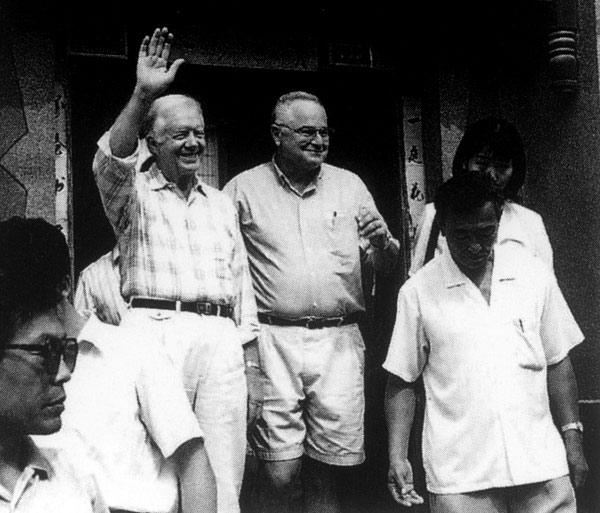 |
|
Former US president Jimmy Carter (left) and US academic Michel Oksenberg (center) visit Zouping in 1997.[Photo/China Daily] |
According to Feng Yuezhao, the US academics lived in Zouping and Fengjiacun during the best of times. "Back then, agriculture formed the basis of our economy. Several years of large harvests made our village the richest in Zouping," he said.
That's no longer the case. On a chilly winter afternoon, Fengjiacun's streets were almost deserted. "Nearly all the young people have left to work in factories. Few of them are interested in agriculture," Feng Yuezhao said.
A time of change
Many changes occurred during and after the US scholars' tenure in the county, Alitto said. "Economic reform unleashed the vast amount of entrepreneurial energy that had always been embodied by the Chinese and their traditions," he said, referring to the "periodic market system"-informal bazaars-that he believes was unique to rural China. "Goods were bought and sold, and information was exchanged at a speed that left me in awe."
Jean Oi, professor of Chinese politics at Stanford University and director of the Stanford China Program, said few people predicted many of the changes. Having first arrived in Zouping in 1988, Oi has revisited many times, often accompanied by her students. "The shift to the private sector was already clear by the late 1990s. But as a consequence of changes in development in different parts of the county, there were a number of surprising changes in the economic fortunes of different townships," she wrote in an e-mail exchange with China Daily.
"Firms that prospered in the early years of reform were overtaken by others. By the end of the 1990s, many successful and powerful collectively owned township and village enterprises were sold to private owners in a process directed by the county government," said Oi, who conducted research into political economy during her time in Zouping. "Many of the changes mirrored larger ones taking place throughout China."
According to Oi, the thriving local industrial sector-the country's biggest cotton textile company, Weiqiao Textile, is headquartered in Zouping-means young people who quit agriculture can find jobs nearby and therefore don't have to work thousands of miles from home. "In that sense, Zouping may not be as representative of rural China as it once was," she said.
Oksenberg, who died in 2001, was Oi's dissertation advisor at the University of Michigan and later a colleague at Stanford. Oi described him as "a true Zoupinger, who had picked up the local accent", and said the US scholars' experience of living in the county was "essential for the understanding of the challenges of governing a country as large and diverse as China".
This "in-depth knowledge of China beyond Beijing" informed the US government's China policy. In July 1997, a decade after the project was launched, Zouping was visited by then-president Jimmy Carter and his wife Rosalynn. Shortly after he returned to the US, Carter wrote an article for The New York Times under the headline, "It is wrong to demonize China".
Qu, the historian, considered Zouping lucky to have been chosen as the site for the project. "Through a crack in the door, the rest of the world and Zouping saw each other and changed each other, in ways that were subtle, yet significant."
Life has come full circle for Alitto, who has visited the county 20 times. Of Italian descent, but born and raised in Pennsylvania, Alitto's extended family means he has always been conscious of his own, and others', cultural history.
"The continuity of Chinese culture and civilization, as evidenced in rural life, resonated with something deep inside me," said Alitto, who in the late 1980s rummaged through the files at the Library of Congress in Washington to unearth valuable information for Qu, who was writing an official history of Zouping.
He lamented the deaths of his old friends in China, including Shi Changxiang, who died early last year, at age 79: "In 1992, I told Shi about Oksenberg's concerns, many years after Oksenberg had predicted that he would die from smoking. We both had a good laugh about that."
Contact the writers at zhaoxu@chinadaily.com.cn